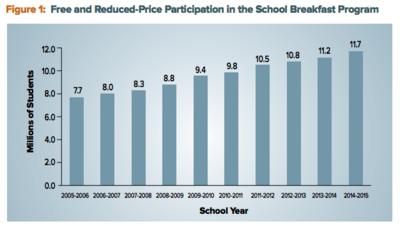A new national report card finds that about 2 of every five K-12 students in America receive free or subsidized lunches and that over 20 percent, or 11.7 million, receive free or subsidized breakfasts in school, the 10th consecutive year of growth spawned by a lackluster economy.
According to the Washington-based Food Research & Action Center, the number of poor school kids receiving federally subsidized breakfasts jumped 4.2 percent in the 2014-2015 school year, or nearly 475,000 more. Free and subsidized lunches were fed to 21,465,354 students, up 436,638.
There are some 50.1 million K-12 public school students in America, according to the Education Department. The school lunch programs are offered in largely low-income schools and non-profit private schools.

Since 2005, the number of students receiving free and reduced price breakfasts has jumped from 7.7 million.
The report’s focus was on the increase in the number of students in the breakfast program compared to the larger lunch program. The goal, they said, is to get poor students in both because studies show that hungry children don’t learn as well.
Overall it found that in the 2014–2015 school year, “54.3 low-income children participated in school breakfast for every 100 participating in school lunch, an increase from 53.2 to 100 in the previous school year.”
The report card also found that over 1,000 more schools joined the School Breakfast Program. There were 89,771 in it, an increase of 1,114. Over 90 percent of those in the larger lunch program were also offering the School Breakfast Program.
West Virginia, Washington, D.C., and New Mexico topped the report card list. In D.C., for example, there were 66 students in the breakfast program for every 100 getting free or subsidized lunches.
While new government efforts to get food to school children was a driver, the lumbering economy also played a key role.
“As the economy slowly recovers from the depths of the recession, many families are being left behind. Wages have remained low and a growing number of working families are relying on the federally funded school meal programs to provide the nutrition their children need throughout the school day to learn and thrive,” said the report.
Paul Bedard, the Washington Examiner’s “Washington Secrets” columnist, can be contacted at [email protected].

